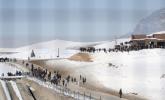 |
 |
ISW Releases Backgrounder on Koran Burnings in Afghanistan
FOR IMMEDIATE RELEASE Contact: Tricia Miller tmiller@understandingwar.org 202-293-5550 x 210 March 2, 2012

Washington, D.C. – Most protests in Afghanistan over the past week have not been spontaneous or independent spates of anti-Americanism, tracking done by analysts at the Institute for the Study of War shows. Instead external actors, insurgent groups and Afghan political factions aiming to harm their local rivals have orchestrated most violent protests.
“If the current protests were a burst of anti-Americanism, we would expect them to be occurring in areas where the Taliban has traditionally been strong and Americans are large in number,” wrote research analysts Paraag Shukla and Isaac Hock. “But this is not the case.”
In provinces such as Helmand and Kandahar where U.S. and coalition forces have concentrated their efforts, protests have been limited and non-violent. In eastern provinces where insurgent groups including the Haqqani Network are still influential, such as Paktia, Khost and Nangarhar, protests reflect a history of violence orchestrated by insurgent groups and Afghan rivals to President Hamid Karzai. Iranian state media and religious figures have incited protests in two western provinces.
The protests started following the accidental burning of Islamic religious texts at Bagram Airfield on Feb. 20. Since then ISW analysts have mapped the spread of violent and nonviolent protests and have updated a timeline of statements by U.S., Afghan and insurgent officials on the response. Karzai’s statements condemning the Koran burning in particular stirred controversy in the U.S.
“Karzai initially released a statement denouncing the Koran burning incident, and it appeared that he would use the situation to further push the U.S. to hand over prison control to the Afghan government, a key element of the strategic partnership agreement that is currently being negotiated,” Shukla and Hock wrote. “However, once it became clear that violent protests had occurred in multiple locations and caused civilian casualties, Karzai called on the population to refrain from resorting to violence.”
To talk to an Afghanistan analyst, please contact Tricia Miller at press@understandingwar.org or at (202) 293-5550 x210.
###
The Institute for the Study of War (ISW) is a non-partisan, non-profit, public policy research organization. ISW advances an informed understanding of military affairs through reliable research, trusted analysis, and innovative education. We are committed to improving the nation’s ability to execute military operations and respond to emerging threats in order to achieve U.S. strategic objectives.